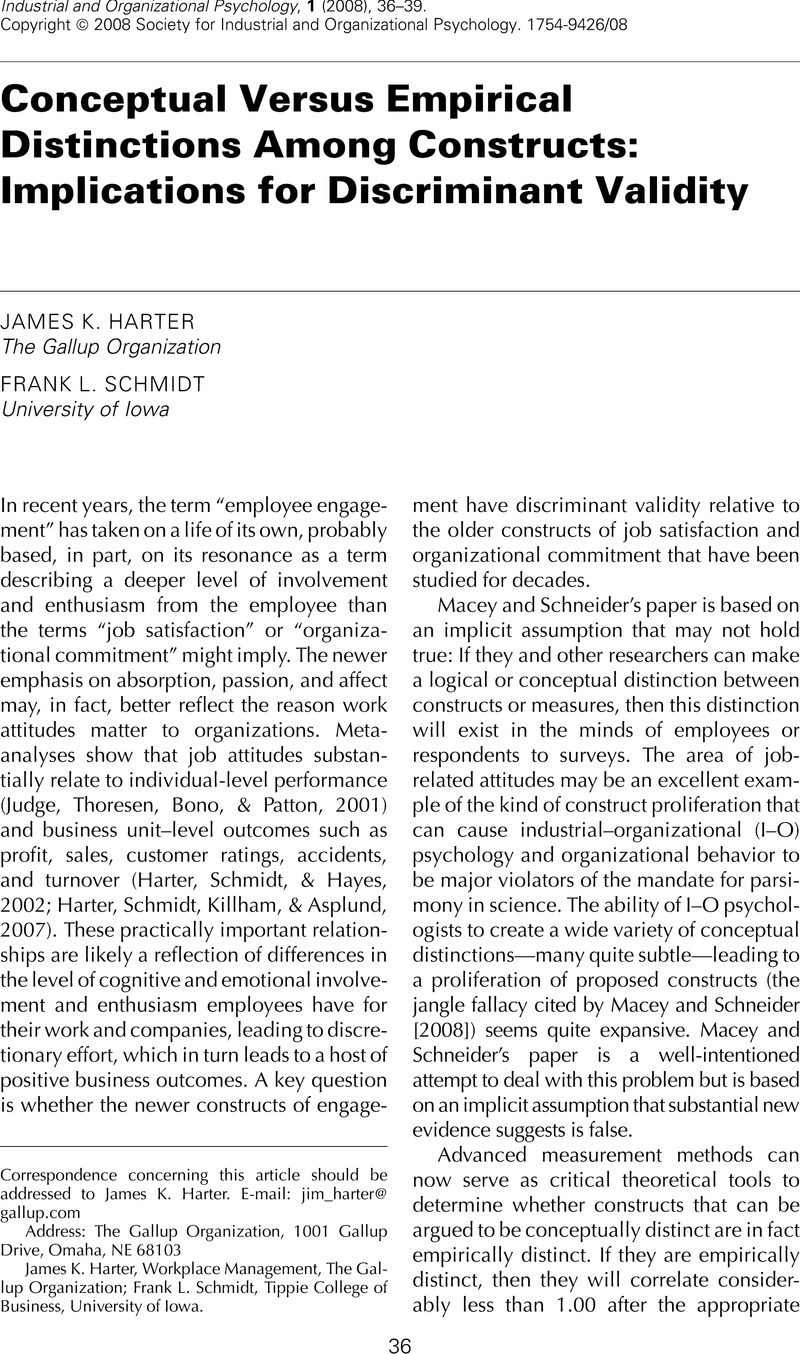Crossref Citations
This article has been cited by the following publications. This list is generated based on data provided by Crossref.
Macey, William H.
and
Schneider, Benjamin
2008.
Engaged in Engagement: We Are Delighted We Did It.
Industrial and Organizational Psychology,
Vol. 1,
Issue. 1,
p.
76.
Attridge, Mark
2009.
Measuring and Managing Employee Work Engagement: A Review of the Research and Business Literature.
Journal of Workplace Behavioral Health,
Vol. 24,
Issue. 4,
p.
383.
Walumbwa, Fred O.
Wang, Peng
Wang, Hui
Schaubroeck, John
and
Avolio, Bruce J.
2010.
RETRACTED: Psychological processes linking authentic leadership to follower behaviors.
The Leadership Quarterly,
Vol. 21,
Issue. 5,
p.
901.
Harter, James K.
Schmidt, Frank L.
Asplund, James W.
Killham, Emily A.
and
Agrawal, Sangeeta
2010.
Causal Impact of Employee Work Perceptions on the Bottom Line of Organizations.
Perspectives on Psychological Science,
Vol. 5,
Issue. 4,
p.
378.
Le, Huy
Schmidt, Frank L.
Harter, James K.
and
Lauver, Kristy J.
2010.
The problem of empirical redundancy of constructs in organizational research: An empirical investigation.
Organizational Behavior and Human Decision Processes,
Vol. 112,
Issue. 2,
p.
112.
Lyons, Sean T.
Higgins, Chris A.
and
Duxbury, Linda
2010.
Work values: Development of a new three‐dimensional structure based on confirmatory smallest space analysis.
Journal of Organizational Behavior,
Vol. 31,
Issue. 7,
p.
969.
Welch, Mary
2011.
The evolution of the employee engagement concept: communication implications.
Corporate Communications: An International Journal,
Vol. 16,
Issue. 4,
p.
328.
Medhurst, Adrian
and
Albrecht, Simon
2011.
Salesperson engagement and performance: A theoretical model.
Journal of Management & Organization,
Vol. 17,
Issue. 3,
p.
398.
Medhurst, Adrian
and
Albrecht, Simon
2011.
Salesperson engagement and performance: A theoretical model.
Journal of Management & Organization,
Vol. 17,
Issue. 3,
p.
398.
CHRISTIAN, MICHAEL S.
GARZA, ADELA S.
and
SLAUGHTER, JEREL E.
2011.
WORK ENGAGEMENT: A QUANTITATIVE REVIEW AND TEST OF ITS RELATIONS WITH TASK AND CONTEXTUAL PERFORMANCE.
Personnel Psychology,
Vol. 64,
Issue. 1,
p.
89.
Cole, Michael S.
Walter, Frank
Bedeian, Arthur G.
and
O’Boyle, Ernest H.
2012.
Job Burnout and Employee Engagement.
Journal of Management,
Vol. 38,
Issue. 5,
p.
1550.
Dalal, Reeshad S.
Baysinger, Michael
Brummel, Bradley J.
and
LeBreton, James M.
2012.
The Relative Importance of Employee Engagement, Other Job Attitudes, and Trait Affect as Predictors of Job Performance.
Journal of Applied Social Psychology,
Vol. 42,
Issue. S1,
Dalal, Reeshad S.
2012.
Handbook of Psychology, Second Edition.
Chiaburu, Dan S.
Muñoz, Gonzalo J.
and
Gardner, Richard G.
2013.
How to Spot a Careerist Early On: Psychopathy and Exchange Ideology as Predictors of Careerism.
Journal of Business Ethics,
Vol. 118,
Issue. 3,
p.
473.
C. Barnes, Donald
and
E. Collier, Joel
2013.
Investigating work engagement in the service environment.
Journal of Services Marketing,
Vol. 27,
Issue. 6,
p.
485.
Alimo‐Metcalfe, Beverly
2013.
The Wiley‐Blackwell Handbook of the Psychology of Leadership, Change, and Organizational Development.
p.
13.
Badal, Sangeeta
and
Harter, James K.
2014.
Gender Diversity, Business-Unit Engagement, and Performance.
Journal of Leadership & Organizational Studies,
Vol. 21,
Issue. 4,
p.
354.
A. Agarwal, Upasna
2014.
Linking justice, trust and innovative work behaviour to work engagement.
Personnel Review,
Vol. 43,
Issue. 1,
p.
41.
De Clercq, Dirk
Bouckenooghe, Dave
Raja, Usman
and
Matsyborska, Ganna
2014.
Servant Leadership and Work Engagement: The Contingency Effects of Leader–Follower Social Capital.
Human Resource Development Quarterly,
Vol. 25,
Issue. 2,
p.
183.
Griffin, Barbara
2015.
Collective norms of engagement link to individual engagement.
Journal of Managerial Psychology,
Vol. 30,
Issue. 7,
p.
847.



